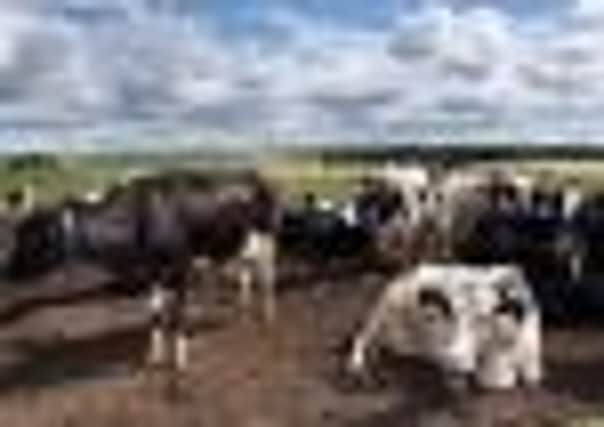Liz Walker: The great unspoken secret of farming and food... and how we can sow seeds of change


It’s the big unspoken secret. Contact any supermarket Press Office – and I did – and out will come yards of stuff about the wonderful relationship we have with our suppliers, how we work together, in equal partnership, to attain the exacting standards we all require, how food safety is never compromised, prices are agreed to everyone’s mutual benefit and – well.
According to the supermarkets, things never went better in Shangri-La. Talk to the farmers – and I have – and these seemingly happy suppliers go pale, tremble and find other things to do.
Advertisement
Hide AdAdvertisement
Hide AdThis relationship is about as equal as that between God and the Israelites. Upset the Big Man and you can look forward to a long spell as a slave in Egypt, with no Moses on the horizon. Good behaviour won’t mean prosperity, but at least you can hope to stave off any cull of the first-born or something similar. Not that your first-born will be assured of a job. Supermarket contracts don’t seem to give any security at all.
But then, why should they? A supermarket’s primary purpose is to make money. It does that by supplying good quality food at prices we are willing to pay, and clearly the British supermarket is brilliant at it.
They are well run, profitable businesses that provide huge numbers of jobs and feed us all to a standard that our forebears could only dream of. If people running lesser businesses can’t match that pace, so be it.
Which is true up to a point. But societies don’t just happen, we create them, making the rules as we go along. Those rules have caused a huge imbalance of power, and we are starting to see consequences that we really don’t like. It used to be compromises in animal welfare. Thirty years ago, I met a friend for coffee at her farm. They had a large pig herd and as our children played together in the yard I asked what was in those dark, low, cabins. They were pigs. Crammed so close together they had to be kept in the dark or they would savage each other.
Advertisement
Hide AdAdvertisement
Hide Ad“We have to,” said my friend. “If we don’t, we can’t make them pay.”
Thankfully that is now illegal. Less encouragingly, that farm is long out of business while the pork they used to provide comes from abroad. We, the consumer, demand that our livestock is reared humanely and then off we trot to buy cheap supermarket bacon reared in much less regulated markets.
Many will say this is down to the EU and in some respects it is. We have no import restrictions so are at the mercy of low wage and welfare economies in Eastern Europe. And this is something our government could do something about.
Labelling should tell us what we need to know. If we are held accountable to high welfare then so should everyone be and if a foreign supplier can’t prove his standards are acceptable we should assume they are not. We don’t have to lie down under this but seem determined that we will.
Advertisement
Hide AdAdvertisement
Hide AdThen we come to milk. Tesco are trumpeting the high price they are paying to their suppliers, and it’s true, prices have gone up. But most farmers don’t sell direct to supermarkets but to processors.
Arla – a Scandinavian co-operative – recently put up their prices by 2p a litre, which was great. But then they charged their suppliers an additional £8.20 for each milk collection, due to the high cost of fuel.
Since they are a co-operative and its suppliers are – in theory – shareholders, they also deducted .5p a litre for the development of their huge new dairy, well positioned to suck in milk supplies from Europe should that suit.
The company is huge and international, so an individual farmer has very little clout. If he doesn’t like it, he has to sell his milk elsewhere.
Advertisement
Hide AdAdvertisement
Hide AdBut if foreigners are playing on our turf why can’t we join in on theirs? They’re paying more for milk in Holland just now so why not start supplying the Dutch market?
The answer of course is that it’s too risky for the individual farmer. Cows produce every day and to be without a buyer is certain death. A shift in the market and the British dairy farmer without a secure contract is toast.
There has to be an answer. Arla got big co-operating and so should we. But the British don’t do it. On the continent you will regularly see great fleets of tractors advancing on the wine, grain, oil or veg co-op.
Here, we have nothing of the sort.
Brave independence may have been the mainstay of British farming over centuries, but if it continues it will also be its downfall. We want beautiful, civilised, productive farms.
Advertisement
Hide AdAdvertisement
Hide AdIf we are to resist the giant dairies and prairies that will take over all the defunct family businesses, we have to make it not only desirable but easy for British farmers to co-operate.
Only then will they have the strength to demand – and get – a fair price. Will that mean more expensive food or lower supermarket profits? Who knows?
Liz Walker is a farmer, novelist and publications officer of Penistone Show.